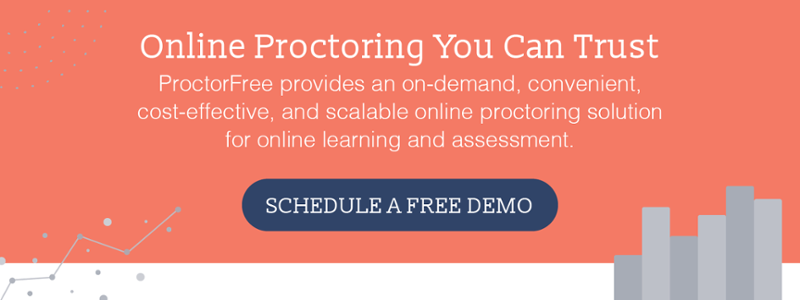talent acquisition
hiring assessments
identity verification
Blog
exam proctoring
recruiting
online assessments
COVID-19
online testing
interviewing

The era of social distancing and remote work has created new complications for talent acquisition with in-person interviews and orientation less feasible than before. For time-strapped hiring managers and recruiters, online proctored assessments can be a powerful tool for learning about a candidate’s skills and competencies.
It’s a phenomenon that is likely to grow as employers seek to differentiate candidates within a more educated workforce. Nearly 70% of hiring leaders expect pre-hire assessments to challenge how college degrees are valued in the hiring process, according to a 2018 study from Northeastern University.
At ProctorFree, we’ve proctored thousands of assessments for companies in the private sector. In the process, we’ve seen firsthand how online proctoring can increase the effectiveness of pre-hire assessments and help companies find the right people for the right jobs.
Verify a candidate’s skills and identity
When it comes to proving skills and competencies, showing is better than telling. Hands-on demonstrations vouch for candidates’ aptitude and their ability to perform under pressure in ways resumes cannot. And employers have taken notice, with use cases ranging from multiple-choice tests to hackathons in the tech world.
Online proctoring brings identity confirmation —already a crucial component of interviews and employment verification — to skills assessments. It allows recruiters to retain control over vetting and onboarding when in-person interaction and testing centers aren’t feasible.
Vet applicants from afar
The mass adoption of remote work appears to have substantial staying power. Almost half of company leaders intend to let employees work remotely full time after the pandemic, according to a survey from Gartner. And a more location-agnostic workforce has profound implications for talent acquisition since companies benefit from a larger talent pool.
When administered online, proctored assessments can help hiring managers lean into this new reality with the potential to reach more candidates across time zones. These rigorous assessments allow employers to prioritize skills first and not lean too heavily on resumes and interviews, both of which can oversell a candidate who underdelivers.
Screen more effectively
In recent years, technology has improved the scalability of applying for a job. In the age of one-click applications, it’s not unheard of for positions to attract thousands of applicants. And while applicant tracking systems can help with the screening process, hiring leaders often find themselves with more candidates than they can realistically interview.
With a robust proctored assessment, you can learn about a job candidate’s knowledge before you ever pick up the phone or review their credentials. With blanket usage, recruiters can establish a baseline for qualified applicants and reserve interview time for more qualified and skilled applicants.
Proceed with clarity
With a web of financial incentives, personalities, conscious and unconscious biases, hiring is a complicated process for candidates and for hiring leaders. The results of a proctored assessment can provide a window directly into how skilled candidates are and the impact they can have on your organization with relative ease. And the objective data those assessments generate mean each new hire can be a confident one.
When used at the aggregate level, companies can use assessments to develop training programs and observe measurable outcomes as a new hire is onboarded. For instance, if a candidate does not understand a basic rule, a company needs to know and correct them before potential liability arises on the job. When assessment data is analyzed alongside productivity and quality metrics, a company can gain insights on the efficacy of its hiring strategy.
Are you interested in administering a proctored assessment? ProctorFree’s software is easy and safe to use. Contact us for a demo.


